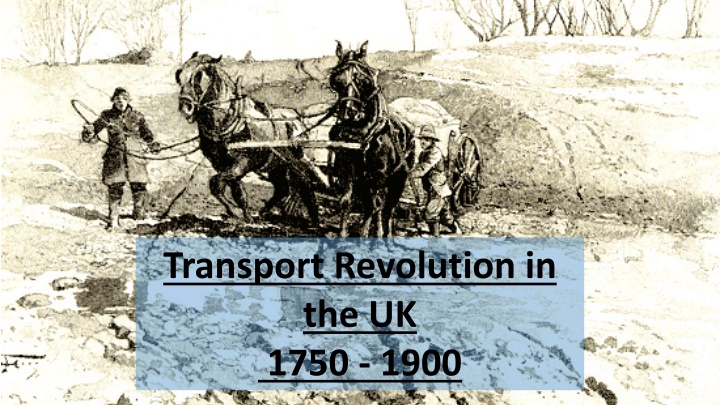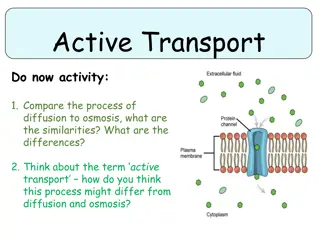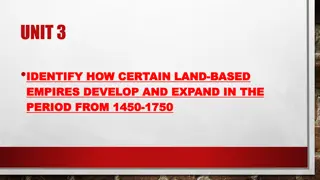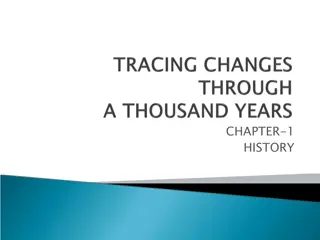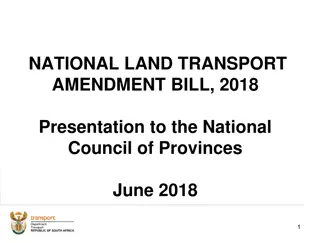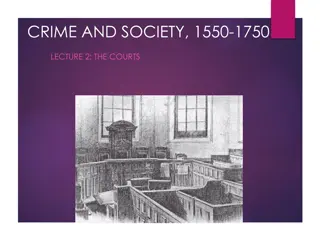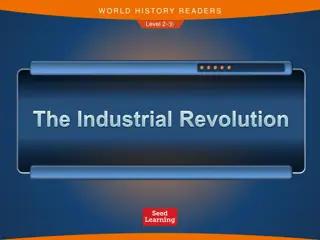Transport Revolution in the UK 1750-1900: A Historical Perspective
Explore the challenges and transformations of Britain's transport network from 1750 to 1900. Delve into the problems faced, reasons for change, and necessity for adaptation. Engage in activities to enhance understanding of the transportation evolution during this period.
Download Presentation

Please find below an Image/Link to download the presentation.
The content on the website is provided AS IS for your information and personal use only. It may not be sold, licensed, or shared on other websites without obtaining consent from the author.If you encounter any issues during the download, it is possible that the publisher has removed the file from their server.
You are allowed to download the files provided on this website for personal or commercial use, subject to the condition that they are used lawfully. All files are the property of their respective owners.
The content on the website is provided AS IS for your information and personal use only. It may not be sold, licensed, or shared on other websites without obtaining consent from the author.
E N D
Presentation Transcript
Transport Revolution in the UK 1750 - 1900
Aims & Objectives Theme: The Transport Revolution 1750 - 1900 Know: What problems faced Britain's transport network in 1750? Understand: Why did Britain s transport network change in the 18th Century? Evaluate: Why were these changes necessary? WILF: What Am I Looking For? Identify & describe: The problems facing the transport network in 1750? Explain: What pressures were forcing the system to change? Analyse: Begin to come to a judgement on which pressures or causes were the most important?
Activity 1: Starter Activity 1: Starter You have two minutes to write as many words associated with transport
Activity 2: Activity 2: What do you already know about roads? You have 2 minutes to write down at least 5 things that you already know about roads in the UK.
Activity 3: Activity 3: List the different ways people and goods were carried by road in 1750 in the sources below: Source B Source C Source A Source F Source D Source E
Activity 3: Activity 3: Answers Self Assess Source B = Wagon Train Source C = Pack Horse / Mule Source A = Mail Coach - Source E = Sedan Chair Source D: Hand Cart Source F = Cart
Activity 4: Activity 4:What problems faced Britain's transport network in 1700? ? At the start of the 18th Century Britain's transport system was very old and slow. It could take several weeks to get from one part of the country to another. Many roads were just mud tracks which ran along the remains of the old Roman roads built over a thousand years before. Why would this road be useless for carrying goods like iron and steel or delicate items made of pottery?
Activity 5: Activity 5: Britain's Transport Network in 1700 Roman Roads in 400 AD What has changed or stayed the same?
Why did Britains transport network change in the 18th Century? In the late 18th Century there was an urgent need for better roads and new faster ways of moving goods around the country. Factory owners needed to get their goods to market. They also needed to bring in raw materials such as cotton and coal to help them produce their goods. With the growing population there were more people living in the new industrial towns and cities. They worked long hours and didn t have enough time to grow their own food. Farmers needed better roads so that they could transport (move) food into the towns to help feed these people.
Causes and Consequences of the 18th Century Transport Revolution in Britain Causes Consequences
Activity 5: Activity 5: 18th Century Transport Revolution Match the head to the tail by drawing a line to connect them. Heads Tails In the 18th Century there was an urgent need to be able to get their goods to market and bring in raw materials such as cotton and coal to help them produce their goods. Factory owners needed they could transport their fresh goods to the people living the new industrial towns Farmers also needed a better transport system so for a better transport system in Britain There was also a demand for people to be able to quickly send a network of roads, rail roads and canals. By the end of the 18th Century Britain had started building Letters, orders and bills to other people
Activity 5: Activity 5: 18th Century Transport Revolution Match the head to the tail by drawing a line to connect them. Heads Tails In the 18th Century there was an urgent need to be able to get their goods to market and bring in raw materials such as cotton and coal to help them produce their goods. Factory owners needed they could transport their fresh goods to the people living the new industrial towns Farmers also needed a better transport system so for a better transport system in Britain There was also a demand for people to be able to quickly send a network of roads, rail roads and canals. By the end of the 18th Century Britain had started building Letters, orders and bills to other people
Activity 6: Activity 6: Which factors were the most important in forcing Britain to improve its transport system? Causes Existing system weren t working very well. Factory owners needed to move their goods to market. The population in the new industrial towns was growing and needed fresh food. Britain was undergoing an industrial revolution so there was more trade. Businessmen and customers needed to be able to send orders and bills quickly. Importance Task 1: Look at the different causes Task 2: Then Decide their level of importance and write them onto the review triangle; the most important at the top and the least important at the bottom.
Task 7: Britain's Road Transport Network in 1800 After Before Roads in Britain in 1700 What has changed or stayed the same?
Plenary: Plenary: Consolidation Threenew things I ve learnt this lesson? Two things that surprised me? Onequestion I d like to ask?
